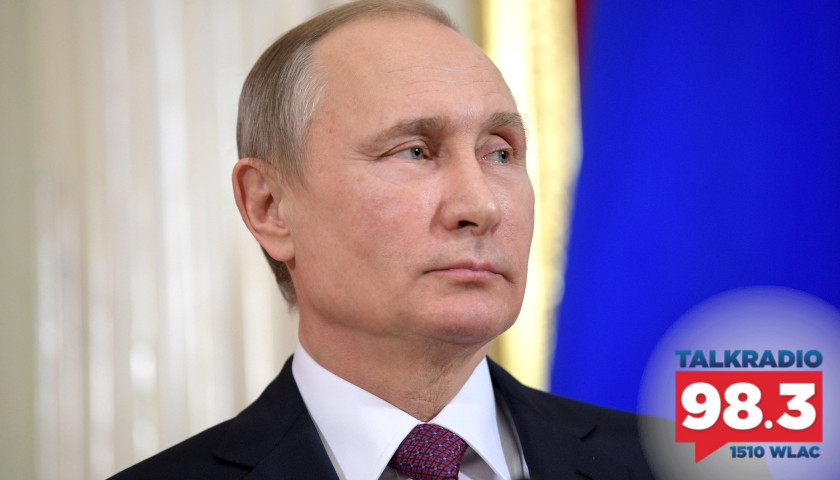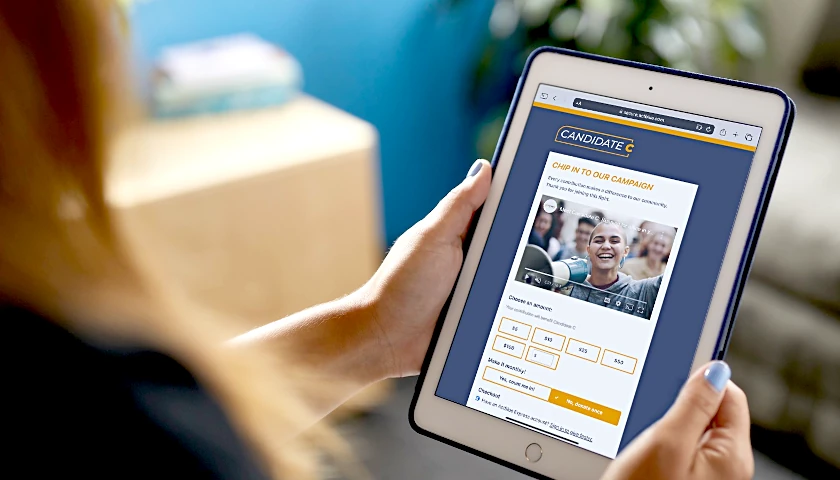Live from Music Row Thursday morning on The Tennessee Star Report with Michael Patrick Leahy – broadcast on Nashville’s Talk Radio 98.3 and 1510 WLAC weekdays from 5:00 a.m. to 8:00 a.m. – host Leahy welcomed international relations expert and contributor for The Epoch Times, Dominick Sansone, in-studio to discuss his background and his opinion of when Russian President Vladimir Putin will stop his attack on Ukraine.
Leahy: In-studio with us, a new friend, a new reporter, with The Epoch Times, Dominick Sansone. Dominick, welcome.
Sansone: Thank you so much. It’s an honor to be on.
Leahy: Dominick, tell us a little bit about your background.
Sansone: So, I originally got started foreign policy as an intern at the State Department during the migrant crisis in North Macedonia. So it’s kind of my first looking at the foreign policy blob, the bureaucracy.
Leahy: Where are you from, Dominic?
Sansone: I’m from Connecticut originally.
Leahy: Connecticut!?
Sansone: Yes, sir.
Leahy: You came down to Tennessee, though, right?
Sansone: Been down here for about five years. Not looking back. I love it down here.
Leahy: You know, there is a big connection between Connecticut and Tennessee. Did you know that?
Sansone: I did not know that.
Leahy: We had the protests against the attempts by the RINO governor, Don Sundquist, back in 2000 to break a campaign promise and put a state income tax here in Tennessee.
The very first people that came down here from Connecticut and said, “don’t do it, because your RINO governor there Lowell Waker jammed through a state income tax,” and Connecticut was ruined thereafter.
Sansone: That’s for sure. And I’m proud of my original statesman coming down here.
Leahy: Where did you grow up in Connecticut?
Sansone: Litchfield, Torrington, northwestern area.
Leahy: You went to college there?
Sansone: I went to the University of Connecticut.
Leahy: A Husky!
Sansone: A Husky, that’s right, sir. I was overseas for a little while. I had a Fulbright grant in Bulgaria, so I kind of got my first foray into foreign policy.
Leahy: Ladies and gentlemen, we have in our studios a Fulbright Scholar. Bulgaria. This is like a big deal.
Sansone: Oh, yeah. Black Sea politics, for sure. And I think the pan-Slavism of what’s going on right now plays into it too.
Leahy: Tell me about the pan-Slavism. What’s Putin doing?
Sansone: When it comes to Putin in Ukraine, I think if you look at his letter, he wrote a 5,000-word article back in July, and basically that wasn’t so much pan-Slavism as it was the historic unity of the Belarussian, Ukrainian and Russian people.
And you’ve heard him use this kind of terminology a lot about the spiritual unity of the Russian Ukrainian people. A lot of people have harkened it to Alexander Dugan, which is kind of this idea of Eurasianism.
Basically that Russia, Ukraine, Belarus, they form a single civilization. And basically what Putin should do is return to that kind of original civilization that’s sort of what the future of geopolitics is, in his view. And a lot of people believe that he’s actually an advisor of Putin, informal, kind of a Rasputin.
Leahy: So how many Ukrainians believe in this spiritual unity with Russia that Putin is talking about?
Sansone: It’s hard to say. It really is hard to say. It depends on what part of the country you’re in. I do certainly think that the Western orientation of Ukraine is certainly based on geography in Ukraine.
In Russia, the idea of Ukraine being a member of NATO or really even an entirely sovereign nation that has no ties to the Russian people, basically from Left to Right across the entire political spectrum is not accepted.
It’s pretty unanimous over there. If you watch Russian state media, everybody basically is on board with what’s going on right now with Putin’s moves in Ukraine.
Leahy: Bring everybody up to speed. As of 7:10 a.m., as we are moving through this program, what’s the status of what’s happening in Ukraine this moment? Russia invading?
Sansone: Yes. So those two breakaway republics, the Luhansk and Donetsk Peoples Republics, is in the southeastern part of Ukraine. Basically, those are divided. When Biden actually took office, Ukraine felt emboldened because again, it was kind of a return to the foreign policy establishment.
Leahy: Ukraine felt emboldened.
Sansone: Yes.
Leahy: What did they do?
Sansone: They started a push to try to retake those provinces. They’re actually divided, which is why the idea is that Russian forces are moving in to basically totally return those provinces or unite those provinces, rather.
And again, after their declared independence to have them be entirely autonomous regions in the southeastern part of Ukraine. Which by the way, was what the Minsk agreements were basically about.
That was Putin saying, we want autonomy for these two regions. Kiev would not agree to that basically because that would give them a potential veto over Ukrainian politics because they would be viewed as essentially Russian puppets.
Leahy: Big question: Where does Putin stop? It’s really hard to say because it’s changing moment by moment.
I really thought that he would just take those entire republics that Donaldk and Luhansk and basically stop there. And he might still do that, but he is certainly launching an assault on all of Ukraine.
There are reports of amphibious landings in Odessa along the Black Sea coast, as well as airstrikes on all of Ukraine cities, pretty much.
Leahy: So right now, we don’t know where he’s going to stop.
Sansone: No, we don’t.
Leahy: And is the Biden administration capable of doing anything to stop it?
Sansone: Not effectively, no. I don’t see it.
Leahy: No big surprise here.
– – –
Tune in weekdays from 5:00 – 8:00 a.m. to The Tennessee Star Report with Michael Patrick Leahy on Talk Radio 98.3 FM WLAC 1510. Listen online at iHeart Radio.
Photo “Vladimir Putin” by Kremlin.ru. CC BY 3.0.
Editor’s note: The views expressed by Epoch Times’ contributor Dominick Sansone are his own and do not necessarily reflect the views of The Epoch Times.





